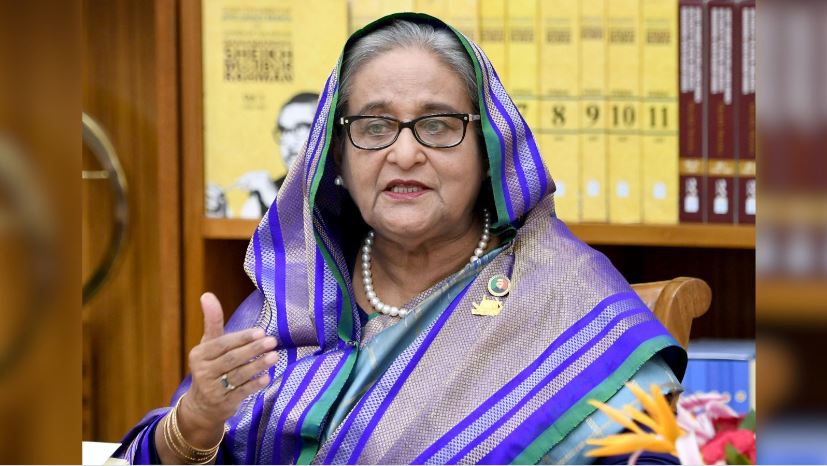Geopolitical Chessboard: Bangladesh’s Precarious Position
Sheikh Hasina, the Prime Minister of Bangladesh, recently embarked on a diplomatic tightrope walk to Beijing, a move seen as an attempt to maintain equilibrium between India and China, two of Bangladesh’s most significant economic partners. However, the visit was marred by an unexpected curtailment, attributed to her daughter’s health, though speculations abound about underlying disagreements with China or the escalating turmoil on the home front.
China’s strategic interest in Bangladesh is palpable, as it seeks to extend its influence in the subcontinent as a counterbalance to India’s dominance. While China’s investments in Pakistan have been substantial, particularly in infrastructure projects like the Gwadar port, Bangladesh presents a unique opportunity for Beijing to expand its reach in South Asia.
Hasina’s Diplomatic Dance: A Bid for Economic Cooperation
Hasina’s visit to Beijing centered on strengthening bilateral economic ties. Although her meeting with President Xi Jinping was brief, she engaged extensively with Premier Li Qiang, culminating in the signing of 28 agreements, primarily focused on trade and investment. Both nations agreed to expedite negotiations for a free trade agreement and optimize their bilateral investment treaty.
A joint statement released by Wang Huning, Chairman of the National Committee of the Chinese People’s Political Consultative Conference, and Hasina proclaimed “extensive consensus” on various regional and international issues. This statement, reiterating the Panchsheel principles, signals a nuanced shift in China’s diplomatic approach in the region.
Economic Aspirations and Geopolitical Realities
Bangladesh, with its burgeoning economy, seeks financial assistance and technological expertise for infrastructure development, energy projects, and technological advancements. Like most of India’s neighbors, Bangladesh has embraced China’s Belt and Road Initiative (BRI). The two nations have elevated their relationship to a “comprehensive strategic-cooperative partnership,” suggesting deeper collaboration across diverse sectors in the long run.
However, China’s actual BRI investments in Bangladesh have fallen short of the grand $40 billion pledge, with the focus primarily on transport, infrastructure, and energy. Hasina’s appeal for increased investment comes at a time when Bangladesh’s economy is grappling with soaring energy and food prices, leading to a significant erosion of its foreign exchange reserves.
Balancing Act: Strategic Favors and National Security
Bangladesh’s aspirations for Chinese assistance in defense and funding for critical infrastructure projects come with a geopolitical price tag. China is likely to demand strategic concessions that could potentially compromise India’s security interests. Already, China wields considerable influence over Bangladesh’s armed forces, which heavily rely on Chinese military hardware.
The success of BRI projects hinges on sustainable financing terms. While Pakistan grapples with economic woes due to its BRI commitments, Bangladesh has exercised prudence in managing its debt. However, with Bangladesh ranking second in BRI funding, concerns about potential debt traps remain.
The Rohingya Conundrum: A Geopolitical Thorn
The Rohingya refugee crisis is a major geopolitical issue for Bangladesh, and Hasina sought China’s support in addressing this humanitarian catastrophe. The influx of over a million Rohingya refugees has strained Bangladesh’s resources, despite international aid from countries like India and China. While China may have promised assistance to gain leverage, its ability to influence the Myanmar military, which has lost control over vast swathes of territory to rebels, is questionable.
Domestic Turmoil: The Student Uprising
While Hasina was in China, a student-led agitation erupted in Bangladesh, demanding the removal of job quotas for the descendants of freedom fighters, minorities, and tribal communities. The protests, marked by clashes with police and the burning of the state television building, have led to a nationwide shutdown of educational institutions and widespread unrest.
Hasina’s remarks on “razakars,” a derogatory term for collaborators with the Pakistani army during Bangladesh’s Liberation War, further fueled the students’ anger. The protests, now intertwined with calls for Hasina’s resignation, suggest the involvement of political opponents and potentially foreign powers seeking to destabilize the government.
Quota Conundrum: Meritocracy vs. Affirmative Action
The root cause of the agitation lies in the perception that the quota system unfairly denies government jobs to meritorious candidates and is prone to abuse by those in power. This sentiment resonates with similar debates in India and other nations regarding affirmative action policies.
The Path Ahead: Navigating Uncertain Waters
As the global landscape shifts, Bangladesh faces the daunting task of maintaining its neutral foreign policy while balancing its strategic interests with major powers like India and China. The ongoing domestic unrest poses a significant challenge to the government, and if not contained swiftly, it could escalate into a full-blown crisis with far-reaching consequences.
Summary
Sheikh Hasina’s visit to China, aimed at balancing ties with India and securing economic cooperation, was cut short amidst diplomatic intrigue and domestic unrest. Bangladesh’s pursuit of Chinese investments under the BRI is tempered by concerns about potential debt traps and strategic concessions. The Rohingya refugee crisis and the ongoing student agitation pose significant challenges to the government. As the global order evolves, Bangladesh must navigate a complex geopolitical landscape while addressing domestic concerns to ensure stability and prosperity.

Sunil Garnayak is an expert in Indian news with extensive knowledge of the nation’s political, social, and economic landscape and international relations. With years of experience in journalism, Sunil delivers in-depth analysis and accurate reporting that keeps readers informed about the latest developments in India. His commitment to factual accuracy and nuanced storytelling ensures that his articles provide valuable insights into the country’s most pressing issues.



